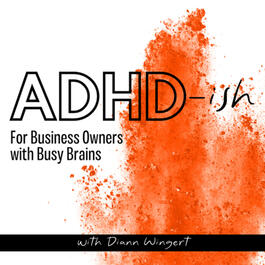
Are You an ADHD Night Owl? It Might be Delayed Sleep Phase Syndrome
If you have (or suspect you have ADHD) and are struggling to fall asleep at a "normal" hour, wake up feeling groggy, or find yourself alert and restless late at night, you might be dealing with something called Delayed Phase Sleep Syndrome, or DSPS. It's not just insomnia or anxiety—it’s a circadian rhythm sleep disorder that often goes misunderstood and misdiagnosed. We'll explore how DSPS differs from the more commonly discussed "revenge bedtime procrastination," which is the habit of staying up late to reclaim a bit of personal time after a busy day. I will also delve into effective treatments like light therapy and melatonin, and discuss how understanding your sleep patterns can be a game changer for those balancing ADHD and entrepreneurship. So, if sleep's been your nemesis, this episode will help you learn how you can finally get the rest you deserve. Understanding DSPS: Unlike insomnia or general sleep problems, DSPS aligns your internal clock much later. It’s not a result of poor sleep hygiene or bad habits, it’s an actual condition in both ICD and DSM diagnostic manuals. Revenge Bedtime Procrastination vs. DSPS: Revenge bedtime procrastination involves deliberately delaying sleep for fun or relaxation, when one feels their day is too packed with responsibilities and too little time for some self indulgence like scrolling social media or bingeing a Netflix series. DSPS is about a genuine inability to fall asleep at typical times. Both are common among those with ADHD and are often confused with each other. Treatment for DSPS: Gradual exposure to bright light in the morning and reducing light exposure before bedtime can help recalibrate your internal clock. Click here for a list of light therapy products recommended by the Yale School of Medicine Dept of Psychiatry Sleep specialists often suggest a 3 mg dose of melatonin taken around 9 PM to help initiate sleep. Click here for the Medical News Today article on treatment options. Click here for blue light blocking (orange) glasses. Fun Fact 🧠✨ Morning exposure to natural daylight—even on a cloudy day—has a more beneficial effect on aligning your circadian rhythm than indoor lights. Past episode of ADHD-ish on the topic of ADHD & sleep:Episode #202_ Morgan Adams on The Impact of Sleep on Women’s Wellness Episode # 28_ Sleep Your Way to Success with Yishan Xu, PhD What did you think of this episode? What topic do you want me to dig into next? DM me here on LinkedIn - Send me an email - Leave me a voice message If you’ve been thinking about launching a private podcast for your business, THE BEST TIME to do so is NOW, with Hello Audio’s...
From "ADHD-ish"


Comments
Add comment Feedback